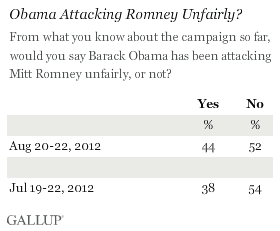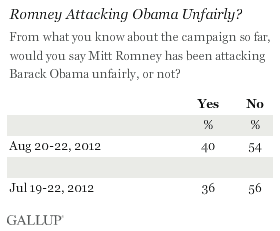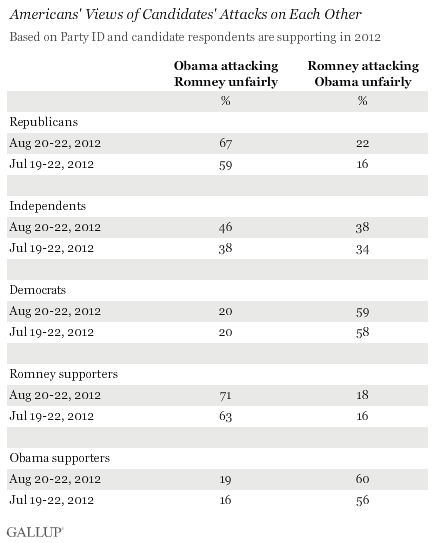PRINCETON, NJ -- Forty-four percent of all Americans say Barack Obama has been attacking Mitt Romney unfairly in the course of the campaign, and nearly as many -- 40% -- say Romney has been attacking Obama unfairly. These findings, from a USA Today/Gallup poll conducted Aug. 20-22, reflect a slight souring of perceptions since last month, when 38% of Americans said Obama was levying unfair attacks and 36% said the same for Romney.


Republicans More Critical of Obama's Attacks Than Democrats Are of Romney's
Beneath the surface, most of each candidate's supporters say the opponent's attacks have been unfair, while believing their own candidate has been fair to his opponent. However, the poll shows an increase since July in Republicans' and independents' perceptions that Obama is being unfair. Two-thirds of Republicans and close to half of independents (46%) now say Obama is attacking Romney unfairly, up from 59% and 38%, respectively. Democrats' views of Obama's attacks haven't changed, at 20% in both polls.
Republicans are also a bit more likely this month to say Romney is attacking Obama unfairly (22% vs. 16%), while independents' and Democrats' views are unchanged.
In line with these results, Romney's supporters are now significantly more likely than they were in July to believe their candidate's opponent is being unfair: 71% vs. 63%. The 60% of Obama's supporters who currently say Romney is attacking Obama unfairly is little changed from last month, when 56% held this view.

Bottom Line
By 71% to 60%, more Romney voters than Obama voters cry "foul" when asked about the fairness of the opposition's attacks on their candidate. The balance of views is a little worse for Obama this month than last, due to an increase in Republicans' perceptions that his attacks are unfair. Additionally, independents have grown more critical of Obama's perceived behavior than of Romney's, resulting in an advantage for Romney on this measure among independents.
More generally, however, both groups -- Obama supporters and Romney supporters -- feel their own candidate is acting fairly while the other is not, resulting in a rough tie in overall public perceptions of whose attacks are unfair.
Survey Methods
Results for this USA Today/Gallup poll are based on telephone interviews conducted Aug. 20-22, 2012, with a random sample of 1,033 adults, aged 18 and older, living in all 50 U.S. states and the District of Columbia.
For results based on the total sample of national adults, one can say with 95% confidence that the maximum margin of sampling error is ±4 percentage points.
For results based on the sample of 480 Barack Obama supporters and 500 Mitt Romney supporters, one can say with 95% confidence that the maximum margin of sampling error is ±6 percentage points.
Interviews are conducted with respondents on landline telephones and cellular phones, with interviews conducted in Spanish for respondents who are primarily Spanish-speaking. Each sample includes a minimum quota of 400 cell phone respondents and 600 landline respondents per 1,000 national adults, with additional minimum quotas among landline respondents by region. Landline telephone numbers are chosen at random among listed telephone numbers. Cell phone numbers are selected using random-digit-dial methods. Landline respondents are chosen at random within each household on the basis of which member had the most recent birthday.
Samples are weighted by gender, age, race, Hispanic ethnicity, education, region, adults in the household, and phone status (cell phone only/landline only/both, cell phone mostly, and having an unlisted landline number). Demographic weighting targets are based on the March 2011 Current Population Survey figures for the aged 18 and older non-institutionalized population living in U.S. telephone households. All reported margins of sampling error include the computed design effects for weighting and sample design.
In addition to sampling error, question wording and practical difficulties in conducting surveys can introduce error or bias into the findings of public opinion polls.
View methodology, full question results, and trend data.
For more details on Gallup's polling methodology, visit www.gallup.com.
